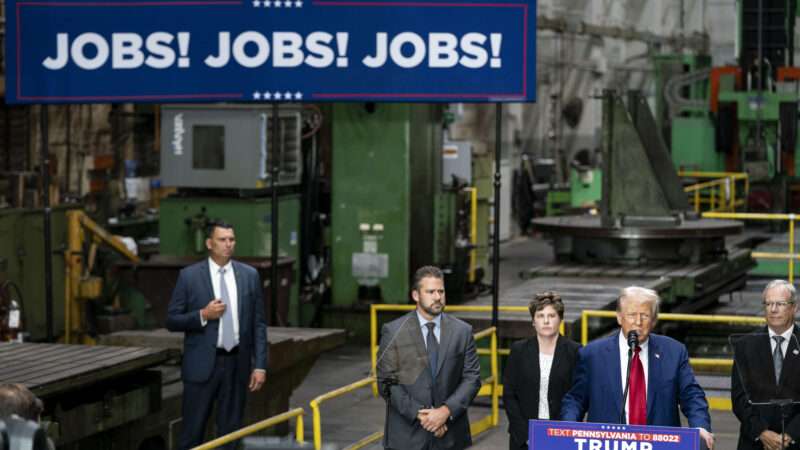
While the gap may be closing, polls tend to show that more Americans trust former President Donald Trump than Vice President Kamala Harris on economic issues. This sentiment is understandable, given the strong pre-pandemic economy during Trump's first term and the challenges of inflation and declining real wages under the Biden-Harris administration.
However, voters pinning their economic hopes on a Trump comeback might find themselves disappointed.
There's no denying that the Trump-era economy prior to COVID-19 was good. Low unemployment, growing gross domestic product (GDP), and a booming stock market were hallmarks of his presidency. In contrast, the Biden-Harris years have been marked by an erosion of American families' purchasing power.
Adding to voter skepticism about a Harris economy is the vice president's apparent lack of a clear pro-growth vision. She's flip-flopped on many issues while rarely talking to the press. It's difficult to know what she really believes about critical economic matters like health care and fracking.
When Harris has given specifics, they've been awful. That includes her anti–price gouging idea, which she has repeated many times, and her desire to hike corporate and capital-gains tax rates. She obviously believes growth comes from government.
However, I have to wonder whether a second Trump term would deliver the economic resurgence voters hope for.
The circumstances Trump would inherit are far more challenging than those he faced in 2017. Consider government debt. On the eve of the pandemic, outstanding public debt was too high—around $18 trillion—but paled in comparison to the current $28 trillion or so. There's no reason to trust Trump to cut spending or pass the necessary reforms, in part because he explicitly says he won't touch Social Security and Medicare, the two main drivers of our fiscal problems.
In addition, even with the economy booming during Trump's first term, he and Congress nevertheless managed to grow the budget deficit to nearly $1 trillion. It stands at nearly $2 trillion today and is projected to reach $2.8 trillion in 10 years.
Trump may believe he'll bring enough economic growth to wash away our financial troubles. But he's mistaken. The scale of the current debt and future indebtedness is so large that economic growth alone won't be enough. There is a lot of evidence that debt can act as a drag on the economy.
One of Trump's most pro-growth achievements was the 2017 tax cut package, perhaps only surpassed by his regulatory reforms. Some provisions are scheduled to expire after 2025, and Congress will probably make the extension worse than the original law. Democrats are pushing hard to raise child credits and other counterproductive tax breaks. With deficits so high, there will be simultaneous pressure to raise taxes in anti-growth ways.
With a willing Congress, Trump might manage to further lower taxes on corporate income and capital gains. But cutting taxes is unsustainable without cutting spending, and he's made the budget math even more daunting by recklessly promising to lift the cap on state and local tax deductions and exempt tip income, overtime pay, and Social Security income from taxation (amounting to trillions of dollars).
Trump could achieve lots of growth with a rigorous energy deregulation program, but that's a serious political challenge which requires discipline and a team he may not have.
Other Trump policy proposals would be destructive. He feels strongly that he'd have "a better instinct than, in many cases, people that would be on the Federal Reserve or the chairman" in setting interest rates. If he decides as president that he's the one who should control monetary policy, he'd be further politicizing what should be an impartial, methodical job, meaning serious trouble in the long run.
More bad news is Trump's just-announced wish to cap interest rates on credit card debt. Price controls proposed by Republicans are just as destructive as those proposed by Democrats. An economy can survive a lot of abuses from the government, but it's almost impossible to endure politicians' attempts to overrule supply and demand, which lead to serious shortages and other problems.
Awful, too, is Trump's proposal to impose across-the-board 10-20 percent tariffs, with a special 60 percent levy on Chinese goods. This would be enormously costly for consumers and damage relationships with our best and most loyal trading partners, denying Americans things we want and need.
The allure of returning to pre-pandemic economic prosperity is strong, but no administration can simply turn back the clock. Given some of the policies Trump is talking about on the campaign trail, he might have a harder time than people believe.
COPYRIGHT 2024 CREATORS.COM
The post Don't Expect a Return to the Trump Economy appeared first on Reason.com.







